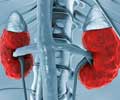Acute kidney injury is the decline in kidney function which can arise following major cardiac surgery because the kidneys are deprived of normal blood flow.
- Patients who undergo cardiac or heart surgery experience postoperative renal function deterioration mainly associated with acute renal injury.
- Commonly held notion that women are at greater risk for acute kidney injury after cardiovascular surgery is now disputed.
- Though previous studies have mentioned that women are at more risk of acute renal failure, the association is not linked with parameters which indicate kidney function deterioration.
What is Acute Kidney Injury (AKI)?
AKI, an abrupt decline in kidney function can arise following any major surgery, often because the kidneys are deprived of normal blood flow during the procedure. It is characterized by a deterioration of kidney function over a period of hours or days following surgery, with symptoms including reduced urine output (less than 400ml/day) or oliguria. Decrease urine output usually results in volume overload, elevated levels of serum blood urea nitrogen and creatinine, and the development of serious electrolyte and acid-base disorders.
Current Evidence that Contradicts the Popular Belief that being a Woman is a Risk factor for the development of Acute Kidney Injury after Cardiac Surgery
Joel Neugarten, MD, Albert Einstein College of Medicine and his colleagues performed a systematic review and meta-analysis of relevant studies published between January 1978 and December 2015 to find out if women are at a higher risk after cardiac surgery. The analysis included 64 studies with 1,057,412 participants.
- Age,
- Gender,
- Race,
- Pre-existing chronic kidney disease,
- Type and duration of cardiac surgery.
“We have disputed the commonly held notion that women are at greater risk for acute kidney injury after cardiovascular surgery,” said Dr. Neugarten.
References:
- Acute Kidney Injury after Cardiovascular Surgery: An Overview - (http://cjasn.asnjournals.org/content/early/2016/10/19/CJN.03340316.abstract)
- Sex and the Risk of AKI Following Cardio-thoracic Surgery: A Meta-Analysis - (https://www.ncbi.nlm.nih.gov/pmc/articles/PMC3487575/)















